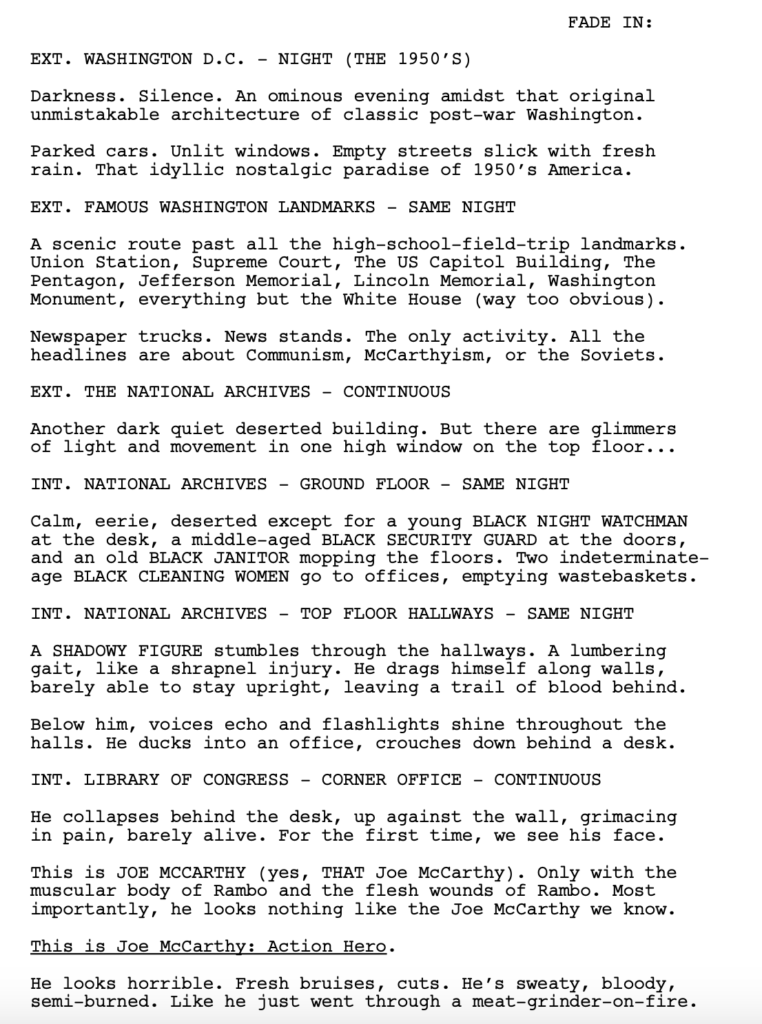Search Results for: amateur

Scriptshadow here to interrupt your regularly scheduled writing time.
I’ve been reading a ton of scripts lately. Usually two a day. What happens when you read that many scripts that close together is you become more in tune with PATTERNS. You start to see the similar mistakes writers are making.
This is great for you guys because it means I can warn you. Which means you can assess if you’re doing the same thing. You can then adjust. And you can make your scripts better as a result.
But before I get into the biggest problem I’ve been seeing lately, I want all of you to take a guess what that is. Stop reading this post and see if you can assess what the problem may be. Because it’s a good sign when screenwriters can be proactive. You should be sussing out potential issues with any screenplay you’re going to write and then coming up with a game plan to circumvent those potential issues.
All right.
Are we ready?
What do you think the problem is?
Here’s what the problem is:
Writers are sticking too closely to the established cornerstones of the genres they’re writing in.
In other words, if you’re writing an action movie, you give us a wise-talking does-things-his-own-way protagonist and every one of your action scenes is one we’ve seen before.
If you’re writing a biopic, you give us that classically misunderstood genius hero (Beautiful Mind, The Imitation Game) and a linear cradle-to-grave storyline with 4-5 flashbacks, usually to a childhood with a difficult parent.
If you’re writing a serial killer script, you give us a detective who’s having some difficult life problems he’s dealing with, a killer who leaves mysterious clues, and a series of investigative visits to leads that provide just enough info to give us to the next lead. Until we get one final big twist we weren’t expecting.
If you’re writing a zombie movie, once the virus has spread, we get a lot of scenes of characters walking around houses or buildings with zombies popping out from behind doorways. We get the same kind of zombies with no alterations whatsoever.
Writers are becoming slaves to the genres they’re writing as opposed to trying to expand, challenge, or reinvent said genre.
For beginner writers, this is inevitable. Beginners often operate by the model: “Imitation is the sincerest form of flattery.” They just want to prove, whether they’re aware of it or not, that they can write the same kind of script professionals do. So they write something that comes from the wrong place. They’re copying others as opposed to expressing themselves. After writing several screenplays, these writers start having something to say themselves and begin to value of being unique rather than being similar.
But this issue can be a problem even for intermediate and advanced writers. I’ve written scripts myself where I wanted to do something different. Go off the reservation, try crazy things. But these drafts ended up being messy and tonally inconsistent and, you could argue, no longer a representation of the genre I was writing in.
So in my subsequent drafts, I would pull back. I would get rid of the wilder stuff so it felt more like the genre I was writing in. And then, in every draft after that, I would reign in the script even more, until, by the end of the process, I had a really slick screenplay… THAT FELT EXACTLY LIKE EVERY OTHER SCREENPLAY IN THAT GENRE.
I can’t emphasize enough that this is ONE OF THE BIGGEST REASONS A SCRIPT WILL NEVER GET NOTICED. And it’s SO FRUSTRATING for writers because even coming up with a pretty good screenplay with a solid main character and a plot that builds in a nice fashion and concludes satisfactorily – that’s hard. That’s hard to do. So the writer feels accomplished when they do so. Which they should. Cause that script is still better than 80% of the scripts written.
But it’s fool’s gold. Cause now you’re in that purgatory. You’re in the top 5-20%. But you’re not where you need to be – in the top 2-3%. You’ve got a competent script but not a script that leaves an impression. And the reason it doesn’t leave an impression is because you’re sticking too closely to the characters and plot beats of that genre. You’re not taking chances. You’re not trying anything new. You’re not pushing yourself with your scenes and your set pieces to really write MEMORABLE moments that we haven’t gotten from other movies.
Another tricky aspect to this is that there is a certain amount of audience expectation in ever genre. If I go to a romantic comedy, I want to see romance and comedy. I don’t want to see action and murder. So if you try and deviate too far from a genre’s tropes, people don’t like your script either. Cause it’s not giving them what they signed up for.
So you have to find that sweet spot. I know that one way to find that sweet spot is to write in a genre that you don’t know well (or even care for) because it’s impossible to write in a genre you don’t like and not make your script feel different from the scripts that usually come out of that genre.
I’m reminded of the way Taika Waititi approached Thor: Ragnarok. From all accounts, Taika was not a superhero fan. This is what he said on the Smartless podcast: “You know what? I had no interest in doing one of those films,” Waititi said. “It wasn’t on my plan for my career as an auteur. But I was poor, and I’d just had a second child, and I thought, “You know what, this would be a great opportunity to feed these children.’”
He wasn’t even a Thor fan! “And ‘Thor,’ let’s face it — it was probably the least popular franchise,” he continued. “I never read ‘Thor’ comics as a kid. That was the comic I’d pick up and be like, ‘Ugh.’ And then I did some research on it, and I read one ‘Thor’ comic or 18 pages, or however long they are. I was still baffled by this character.”
Yet, many people consider Thor: Ragnarok to be the best Marvel movie. A huge reason for that was Waititi injecting his unique sense of humor into a character who, up until that point, had been kind of dull. It brought the character alive and made all of us see him in a different, more exciting, light.
There’s something about not having this precious responsibility to a genre that allows you to push the boundaries of it.
The other way to circumvent this issue is to be OVERLY CONSCIOUS of the problem going into the script. You may love a genre. LOVE IT! But you must tell yourself that that love is going to get you killed if you’re not careful. You actively commit to not writing the predictable obvious version of that story. Do something different with the main character. Do something different with the point of view. Jump between 8 characters instead of staying with one. Doing something different with time, like what David did yesterday with his real-time script, Clementine.
But, most importantly, don’t give us the same old tried-and-true set pieces, scenes, and moments that we get in that genre. Standout scenes are the ones that have the potential to stay with your reader. If you write a really great one – like the childbirth scene in A Quiet Place – it completely reinvents how the reader sees your script. We’re now imagining a MOVIE as opposed to nodding our head thinking that the writer is pretty good.
“Pretty good” is WORTHLESS. It has zero currency in Hollywood. But pretty good is what you’re going to get if you write the version of that genre that everybody else does. I promise you that’s the case.
So stop settling for the obvious. Stop regurgitating characters and scenes and set pieces from your favorite movies. Cause guess what? All we readers see when you do that? Is “lesser versions of that awesome movie we already saw.”
I don’t mean to be blunt but I’m trying to give you a kick in the butt here. If you can embrace this mantra, I promise you your scripts are going to be so much better than the majority of your competition. Cause most writers don’t want to put in the work that it takes to get to that originality. Okay, back to writing. Good luck!
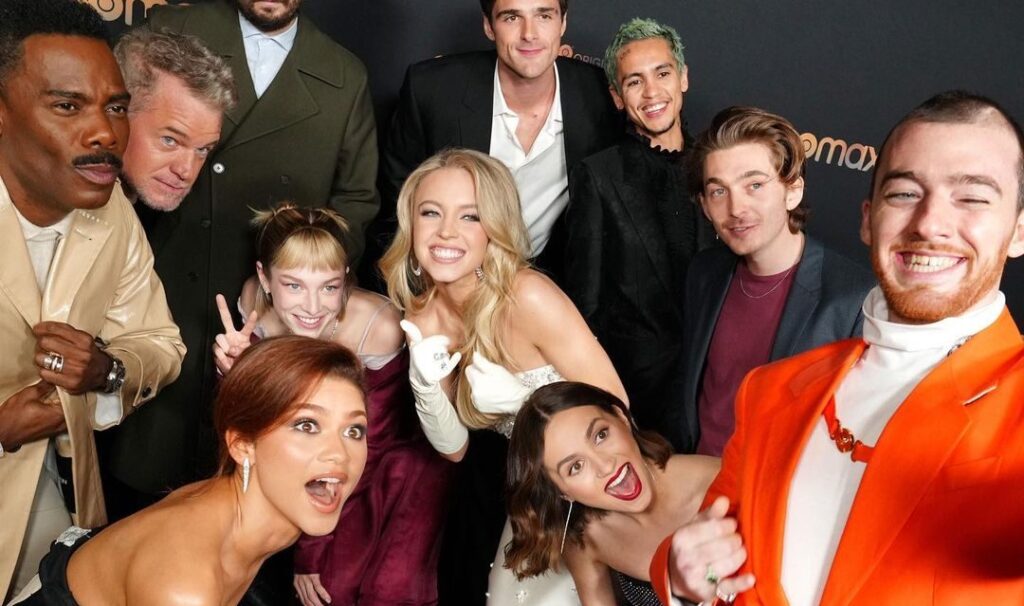
Amateur Showdown is back, baby!
But I’m going to utilize a little writing tool I call… suspense… and make you read this entire article before I reveal the showdown genre. I’ve also programmed the post so that if you try and scroll down and check to see the genre first, the article automatically disappears. Sorry!
But don’t worry. I plan to keep you entertained in the meantime. And today, I want to talk about Emmy nominations.
Did you know there are over 500 shows on television? That’s correct. I did not accidentally add a “0.”
With that many shows, there are bound to be plenty of “snubs.” But I’m not up in arms about the fact that Yellowstone didn’t get any noms or that Atlanta was ignored for best drama. I’m more focused on the shows that kicked butt.
Succession – 25
White Lotus – 20
Ted Lasso – 20
Hacks – 17
Only Murders in the Building – 17
Euphoria – 16
Barry – 14
Dopesick – 14
Severance – 14
Squid Game – 14
Ozark – 13
Stranger Things – 13
The interesting thing about having 500 shows is that we’ve all grown more picky about what we watch. We know that, the second a show slows down, it’s an opportunity to watch some other shiny new show. A bad habit I’ve fallen victim to many times.
I have not made it through all of Succession Season 3. I didn’t feel any compelling reason to keep watching the third season of Barry. I started to see the weak writing creep into Ozark a couple of seasons ago and it’s only gotten worse since. Which is a shame because it started with so much promise.
However, I’m thrilled about White Lotus. You guys know how infatuated I was with that show. Hell, I did an entire week of articles on it (Day 1, Day 2, Day 3, Day 4, Day 5). I think Euphoria is operating on another level. A lot of people point out how the secret ingredient to Stranger Things is its amazing casting. And I would agree with that. But I also think Euphoria’s casting is 100 times better than Stranger Things, so much so that it’s going to be responsible for the next 20 years of movie stars. From Zendaya to Jacob Elordi to Sydney Sweeney to Angus Cloud to Hunter Schafer. They’re all sooooo good.
I love seeing Squid Game on there because I’m unapologetically an enforcer of the high concept (cough cough *ahem* – foreshadowing) and this is the highest concept show of the decade. I don’t think I’ve ever anticipated a reality show more than Squid Game. It’s going to be so much fun.
A lot of the other entries, I’m lukewarm about. I didn’t like them, I didn’t dislike them. But I have noticed this trend occurring where, somewhere around the third episode, a show either flies or falls.
This happened with Severance. It happened with The Old man. It happened with Moon Knight. It happened with Ms. Marvel.
I LOVED the pilot for all of these shows. But that’s the thing about pilots. The pilot of a series is the script that will have been worked on the most. So you usually see a dip in the second episode. And then the third episode acts as a “decider” episode. Pilot was awesome. Second episode was a letdown. Third episode tells us which one represents the true quality level of the show.
With Severance, it just started to get too weird. And I’m okay with weird. But when you match weird up with a depressing tone, which Severance embraces fully, it doesn’t get your juices flowing to continue.
The Old Man started out AMAZINGLY. It’s like, what if Jason Bourne was 70? But once it leaned into its Afghanistan plot, which turned out to be way less cool than they implied it was going to be, I was out.
Ms. Marvel is proof of just how important directing is. The Bad Boys 3 guys directed the pilot and they put so much energy into it. I literally thought we were watching the birth of the female Spider-Man. It had that same quality that Tom Holland’s Homecoming had.
But once they left, the episodes become lifeless and dull. And the mythology turned out to be really dumb. They shouldn’t have brought these ancient people into the mix. It turned what was a cool idea – a popularity-starved teenager gets superpowers yet must watch everyone else around her become social media famous – and just made it silly and unfun.
Moon Knight also had a great pilot. The whole thing where he wakes up in some town in the middle of nowhere and this cult leader is sacrificing people — it was so well done. And then it just became too crazy. He was crazy. The villain was crazy. Lots of crazy things were happening to him. He never knows who he is or what’s going on. The show didn’t have anything to ground it and therefore fell apart.
I suspect what’s happening here is that writers still haven’t figured out how to structure the 2022 version of an inaugural TV season.
It should be obvious. Most of these shows are 8 episodes long. And 8 episodes fits nicely into the three act structure. The three act structure says the first act should be 25% of the story, second act 50%, and third act 25%. Which would mean that the first act is the first 2 episodes, the second act is the next 4 episodes, and the third act is the final 2 episodes. It’s perfect, right?
The problem is that if you spend the first two episodes setting up your story, you risk the viewer checking out. Viewers need something to get excited about. So writers sort of freak out and go all-in on a big pilot episode, which now creates an imbalance in the structure. Because now there’s a natural falloff in the second episode. Which pushes us into the second act (episode 3-6) on a weak note. The turn into the second act should be one of the most exciting times in your story, as it’s the beginning of the journey.
This has led to most writers winging it, to varying results. Sometimes they make it work, like with Squid Game, and sometimes they don’t, like with The Old Man.
Even my favorite new show, The Bear, had a very quirky structure that never quite worked. There isn’t a natural thru-line to the narrative. It kind of jumps all over the place and tries ideas (today’s episode is going to be about catering!) and, if I’m being honest, the finale was a narrative nightmare. The show gave random characters who had never talked to each other entire 8 minute dialogue scenes with one another.
So why did I still like it?
It’s because with television, it always comes back to character. If you create really compelling characters, that can get you through any plotting issues. And The Bear has 5-6 really fun characters. It also was smart in making its episodes 30 minutes cause it didn’t have as much time for the narratives to crumble.
Remember that, traditionally, that’s all TV used to be, was character. You didn’t have overarching season-long plots because, back in the day, executives felt that people would forget the plots in the week between episodes. So episodes were more standalone. That’s why sit-coms were so popular, as well as procedurals. You didn’t need to know what happened last week to enjoy the standalone plot of ‘catching the killer’ this week.
But now TV seasons have become mini-movies and nobody has really figured out how to do that. Because one of the ingredients that makes a movie a movie is urgency. Things need to happen *RIGHT NOW*. 99% of TV shows don’t have that. So you’re creating a movie that sort of limps along at a casual pace. And those two worlds are hard to marry.
It’s why I think White Lotus worked so well. Because the show had that clear time-frame – one week at the White Lotus hotel. It’s not 48 hours. But it’s still short enough that we know things are coming to a head. Which propels us to keep watching. And yet White Lotus was, at its heart, a TV show, because it focused so much on character.
Which is the ultimate lesson here. When you’re writing TV, it’s got to be character 70% and plot 30%. Spend all the time you have outlining focusing on, “How do I make each one of these characters as interesting as possible?” And then if you can throw a strong plot on top of that? It’s like gravy. You’ll have a hit show.
Okay, I’ve made you wait long enough.
What is the next Amateur Showdown??
I was thinking the other day about The Hangover and how The Hangover was the last giant feature comedy hit. Why is that? Why haven’t any comedies lived up to it since? My belief is that comedies got too low-concept. They got too “Apatowed.” It was less about concept and more about peoples’ lives. The possibility of a comedy titled, “GETTING MARRIED,” was very high. What was this comedy about? It was about the hilarious shenanigans involved in people getting married.
I’m not saying that can’t be funny. But where is the creativity in that concept? It’s a 3 out of 10, at best. The Hangover was a mega-hit, at least in part, because it was a genuinely clever concept.
Now, don’t worry. We’re not doing a comedy showdown. I’ve learned that us Scriptshadow types aren’t good with comedy. We are all very unfunny people, lol. However, that realization reminded me of how powerful the high concept is. And I believe that the high concept is on its way back. We just saw it with the sale of Classified. That’s only going to drive more studios to look for high concept material.
Is “high concept” a genre? Not really. But that’s why I want to use it. It’s something that can be used in almost every genre, which gives you a lot of flexibility for ideas to come up with.
So…
THE NEXT AMATEUR SHOWDOWN
Genre: High-Concept
When: December 1, 2022
Include: Title, genre, logline, Why Your Script Should be Chosen, a PDF of the screenplay
Where: carsonreeves3@gmail.com
Start?: You can start sending in your entries right now!
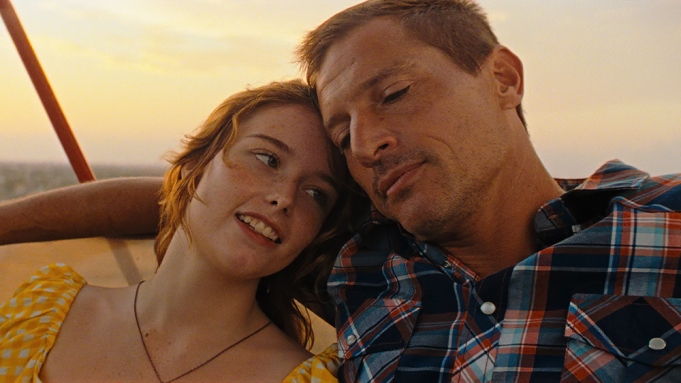 If you can write a character like Mikey, in “Red Rocket,” you’re in the discussion!
If you can write a character like Mikey, in “Red Rocket,” you’re in the discussion!
So, recently, a producer came to me saying he had a project he was trying to put together and needed a writer for it. This wasn’t some giant producer. But it was someone who could pay a writer real money. He hadn’t had a lot of success with literary agents, who he found pushed their weaker writers on him since he wasn’t A-List. Which is why he came to me. He knew I’d read more amateur screenwriters than probably anyone in town so, he figured, if there’s anyone who can find me a writer, it’d be Carson.
I get inquiries like this every couple of months and whenever I do, it helps me zone in on what it is that actually makes a good screenwriter. Because when you’re talking about screenwriters theoretically, there’s a leniency in your judgement. I want every screenwriter to succeed, especially the screenwriters on this site. So I see them through the lens of optimism and potential as opposed to reality.
But when someone’s paying money, all of that goes away. The last thing I want to do is refer a writer to someone, have that someone pay them a big check, only for the writer to deliver a weak script. Cause, of course, then I look bad.
So, all of a sudden, my eye becomes more astute. I’m able to see exactly what makes a screenwriter worthy of being a paid professional as I am literally recommending them to be paid. What is it I notice that prevents me from recommending someone and what is it I notice that leads to me endorsing them? That’s what I want to talk about today.
The first thing I notice is that the pool of writers I’d recommend to a producer is very small. We’re talking .5% of all the amateur writers I’ve read. Now before you freak out about that number, you have to understand that I’m not talking about recommending a writer to an agent here, of which the bar is more in the 3-5% range. I’m talking about actual money being transferred into the writer’s bank account. That’s a different conversation.
It’s the difference between potential and someone who’s got the goods. There are actually a handful of EXTREMELY TALENTED but raw screenwriters I know who I’d never recommend for this job because, to do this job, you have to understand the *craft* of screenwriting. You have to understand what the producer wants and have an actual game plan for putting it on the page.
These super-talented writers may have strong voices or a knack for great dialogue or a talent for taking stories to unexpected places. But many of those talents are connected to the freedom of constructing their own narrative. That approach doesn’t work as well when you’re adapting someone else’s idea.
To do that, you really need to understand structure. This is where the debate on whether there’s a “right” or a “wrong” way to write a screenplay leans towards “there is a right way.” Because the majority of Hollywood operates in the 3-Act Structure. Act 1, Act 2, Act 3. A beginning, a middle, an end. Setup, conflict, resolution. 25 pages, 50 pages, 25 pages. If you don’t understand that, it’s very hard to have a common language with your employer.
So that’s one of the first things I look for. I say to myself, “Do they understand the 3-Act Structure?” Cause if they don’t, it doesn’t matter what else the writer is good at, the script isn’t going to be paced well. It won’t have direction. It’ll feel like it’s wandering a lot. You got to have structure down, which, by the way, takes most writers about six scripts to feel comfortable with.
The next thing I think about is character. Specifically, have I read characters from this writer THAT I REMEMBER. Characters who jump off the page. Most screenplays – to be fair, even a lot of professional ones – give you characters who work for the story. But those characters don’t stick out. In other words, if you took the story away and just put that character in a bunch of random scenes, would they stick out? Would they be memorable?
For the majority of writers, the answer is no. They haven’t figured out how to do this yet. What do I mean by “memorable” character? Any character who feels larger than life via their charm, their pain, their eccentricities, their personality, their presence. Arthur Fleck, Louis Bloom, Cassandra in Promising Young Woman, Thor, Mad Max, Mikey in Red Rocket (guy in Ferris wheel at the top of this post), Mildred in Three Billboards. These are characters who rise above the page.
If you can pull these two things off, you are in the running. Cause these are the two most important things when it comes to nailing an assignment.
Dangling just below these two is dialogue. I’m not so much a “dialogue has to be great” guy as I am a “dialogue has to be good” guy. The reason for that is, great dialogue is rare. Name me three movies with great dialogue from last year. You probably can’t. Also, ironically, the better the dialogue is, the more subjective it becomes. That’s because flashier dialogue has more personality, and whenever personality is involved, some people hate that personality and some love it. Look no further than Juno’s dialogue as an example.
So I’m looking for dialogue that’s solid. There’s an honesty to it. There’s an effortlessness when it comes to covering exposition. The writer understands what dramatic irony is. They understand what subtext means. They also have the ability to add some extra flair to the dialogue to make it sound heightened, without it feeling try-hard.
If you can do those three things well – structure, character, dialogue – you are very much on my radar. I am now considering you for a paying job. Because now I know, at the very least, you are going to deliver a competent draft.
So, we’ve shrunk our pool of writers down to a small group. Who gets the job out of the remaining scribes?
Before I give you the general answer, I’ll give you the real-life one, which is that it depends on the project. If the project is dialogue heavy, I’ll go with the writer who writes the best dialogue. If it’s a comedy project, I’ll go with the funniest writer. If it’s a project that requires a certain weirdness, like The Lighthouse, then I’m recommending the writer with the most offbeat voice.
But if it’s a more generalized project, like, say, a biopic, I’m simply going with the best writer, or the writer I think has the most talent. Not only are they able to do all the things I listed above, but they also have that rare x-factor where they’re able to construct fictional stories in fresh and unexpected ways that make you feel things that you don’t feel when you’re reading everything else.
Another way to look at it is, somebody who’s the opposite of the average writer. The average screenwriter – someone who’s studied the craft and written more than six screenplays – does everything well, but nothing exceptionally.
If you want to become a paid screenwriter, you have to do at least one thing exceptionally. It can be that you write memorable characters, it can be that you write great dialogue, it can be that you’re so locked into the human condition that you can turn the average moviegoer into a slobbering pile of tears. But it’s gotta be something.
And part of the process of becoming a professional writer is identifying not necessarily what you *want* to be good at, but what you *are* good at, then writing scripts that allow you to showcase that talent. And then writing more of those scripts. And then writing more of them. Until you become an expert in that one specific area of writing. Because that means that when that type of project comes around, producers are going to think of you.
Finally, being the best at any aspect of writing is really hard. So there’s another option. Create your own future. After watching Tangerine this week (shot on an iPhone) and Cha Cha Real Smooth (made by a 22 year old), I’m reminded that sometimes it’s better to bring your own stuff to life than wait for someone else to anoint you. Because, do I think that Tangerine or Cha Cha Real Smooth would’ve lit the screenwriting world on fire? No, I don’t. Tangerine might’ve made The Black List. But Cha Cha Real Smooth wouldn’t have. So if those two were waiting for someone like me to say, “You’re the best of 10,000 writers,” they’d still be waiting. They went out and put those pages on the screen.
The point is, you have options. If nobody else believes in you, you can still succeed by believing in yourself. Whatever route you take, make sure to give it everything you’ve got. Cause I promise you, the competition is too stiff for any other approach.
Happy writing this weekend!
$100 OFF DEAL! – I’m giving $100 off two feature screenplay consultations this weekend. E-mail me at carsonreeves1@gmail.com with subject line: “100.” I give screenwriting consultations for every step of the process, whether it be loglines, e-mail queries, plot summaries, outlines, Zoom brainstorming sessions, first pages, first acts, pilots, features. If you’re wondering where your structure, or characters, or dialogue, stand, you can ask me to focus on them in your notes and I’ll be happy to assess them. E-mail me and let’s set something up!
Genre: Action/Fantasy
Premise: A combat veteran fights to keep his inexperienced squad alive in the remote Scottish Highlands as they’re hunted by descendants of a Celtic Demigod.
Why You Should Read: I’ll let the logline speak for itself, either it’s your bag or not ;)…. Comparisons: Dog Soldiers/Wickerman/Southern Comfort.
Writer: B. Jack Azadi
Details: 97 pages
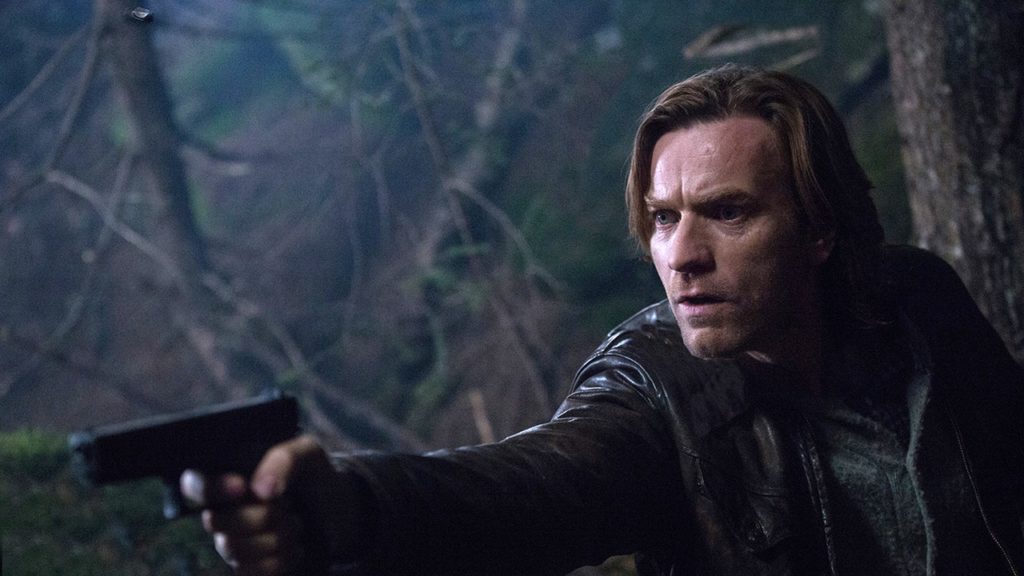
I LOVE this setup. I love anything where a group of tough dudes try to take down a supernatural something-or-other. It’s why I loved Aliens. It’s why I loved Predator. It’s why I liked Pitch Black. There’s something about that moment where they realize they’re vastly overmatched that gets me every time.
Surprisingly, these movies have fallen out of favor the last couple of decades. I’m not sure why but I suspect it’s because there were a bunch of Aliens clones that kept coming out summer after summer that were horrible. That and the fact that teams in camouflage have been replaced by teams in capes. The movie that probably sunk them for good was 1998’s Deep Rising. God was that movie bad. But I still think this is a winning formula when done well. Which is why I’m excited to read The Last Scion.
Let’s take a look!
A Scottish military unit has gone missing. So it’s up to a new unit, led by Lieutenant Greystone, to head up into the Scottish Highlands to find out what happened to them. Greystone will be accompanied by combat vet Sergeant Jackson, mysterious intelligence official Lieutenant Parker (the lone female on the team), a tough dude named Paddy, and roughly ten more men.
The team heads up to where the missing unit was last spotted and they find their first clue – a dead soldier’s body whose face has been eaten off. At this point, they’re operating on the thesis that some sort of animal attacked the team. And when they see some overgrown wolves scurrying about, they figure they’ve got their “man.”
But then, when everyone is hanging out at camp, a freaking axe comes flying out of nowhere and lodges itself in Greystone’s face. The soldiers go nuts, busting out their guns and firing in every direction. After everyone settles down, they construct a new plan: GO BACK DOWN THE MOUNTAIN AS FAR AWAY FROM THIS PLACE AS POSSIBLE.
Except it’s not going to be that easy. After a nice old lady kills one of their soldiers, the crew asks Parker what she knows. She confesses that they might be up against Celtic warriors who have kept living up here for centuries and they may even be stronger than average men. No sooner than that analysis is dropped, Parker, Paddy, and Jackson are kidnapped and brought to the Celtic village. Once they realize they’re going to be slaughtered, their final plan is formed: ESCAPE AT ALL COSTS.
For obvious reasons, I was hyper-focused on the first act of The Last Scion, which makes some pretty large blunders that send ripples throughout the rest of the screenplay. Let’s take a look at these trouble spots.
The first issue is the teaser. The teaser takes place 10 years ago. We follow an injured female soldier in the Western Mountains of Scotland as she runs from something. We see her run, we see her run, we see her run. She falls. A wolf emerges, grabs her, drags her off-screen. END OF TEASER.
Now you might say, “What’s wrong with this teaser, Carson? You’ve got an injured woman. She’s running. Something’s chasing her. There’s a lot of excitement going on. Isn’t that what you want?”
No.
Well, yes. It’s great to have a life or death situation in a teaser. But if all you’re showing us is generic imagery (a woman running, a woman falling, something pulling her away), it doesn’t register at all. It feels like every other version of this scene ever. You have to find a way to make it different, like in “It Follows” where a woman is running away from seemingly nobody. Or you have to throw some reveal in there that turns the scene upside-down. Like in Halloween where, after we witness this brutal murder in POV, we reverse to see the mask taken off and it’s a ten year old boy.
A garden variety action sequence is no better than no action at all.
But the much bigger faux-pas of The Last Scion is the character introductions. The character introductions were so restrained and/or minimal that I didn’t even know who the hero was. I assumed it was Parker, since she was the outsider. Let’s check out her introductory scene:
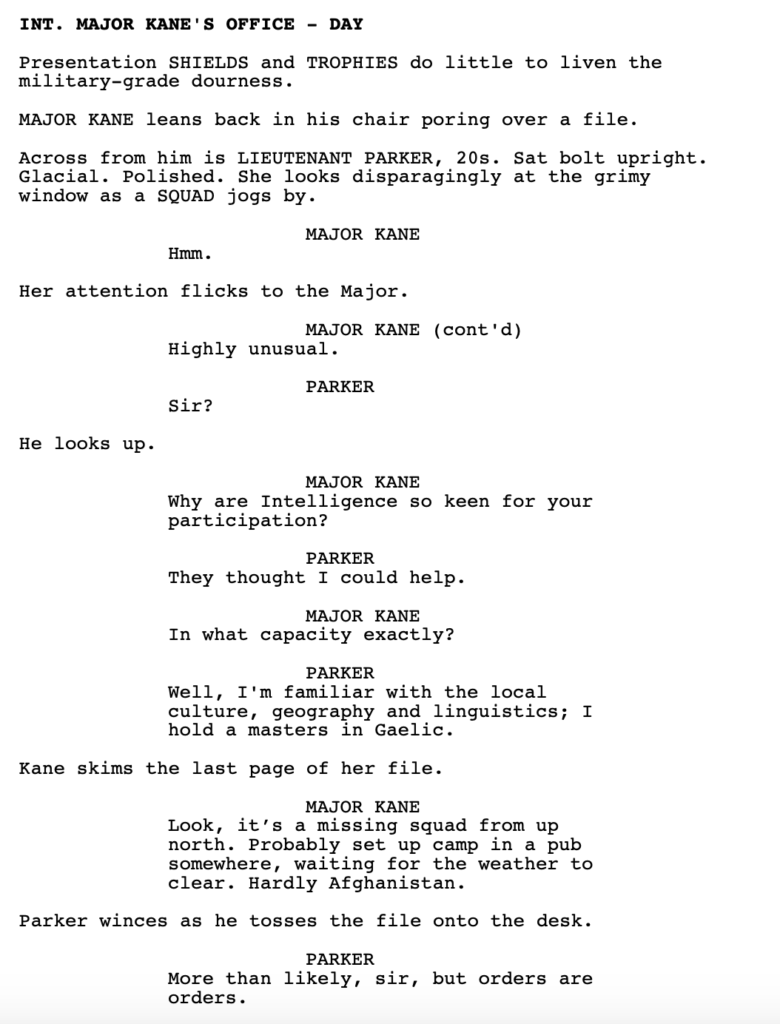
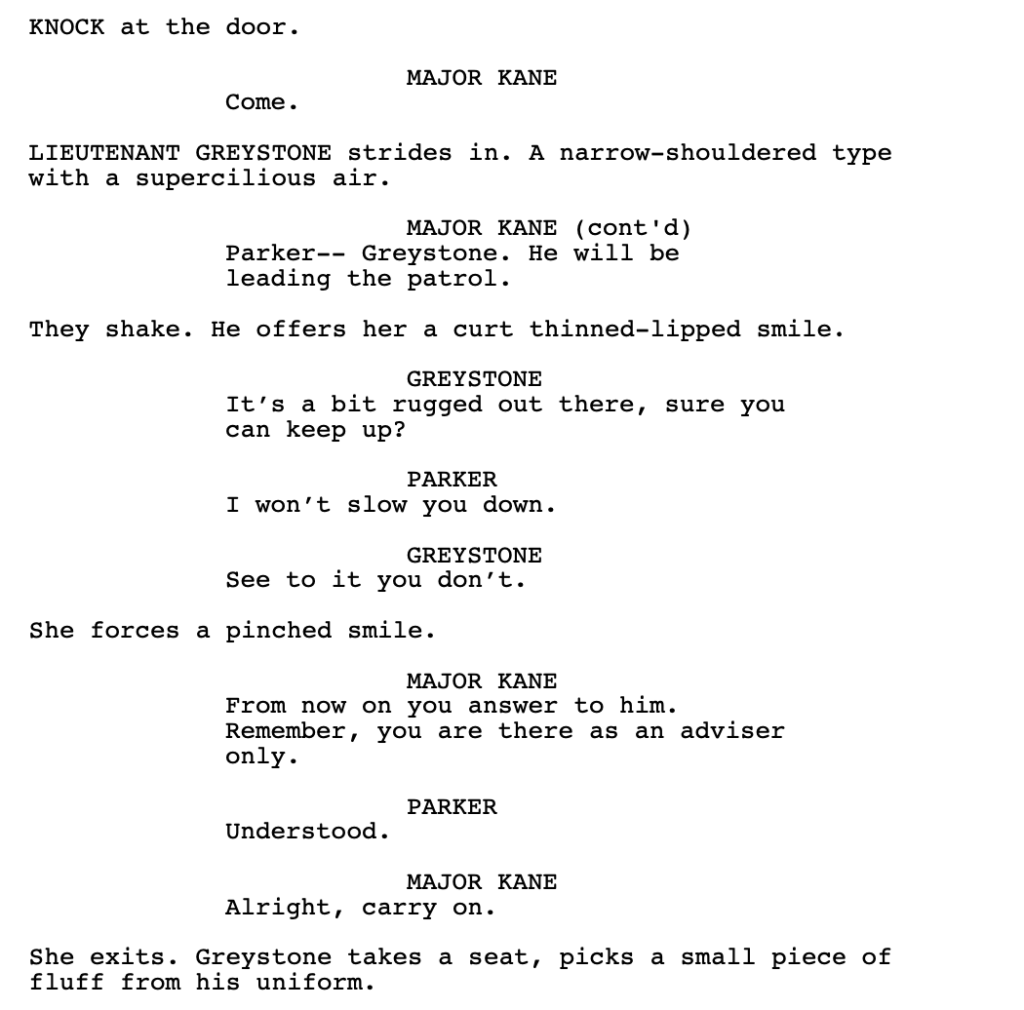
Is this the opening of an exciting character you want to get to know better? All she does is sit in a chair and answer questions. That’s not how any major character in your script should be introduced. Introduce them with panache. Show us why they’re cool, unique, dangerous, exciting, interesting, mysterious, ANYTHING. Anything more than “Answers Questions Woman.”
The final three characters who survive in the script are Parker, Paddy, and Jackson. Let’s check out how Paddy and Jackson are introduced…
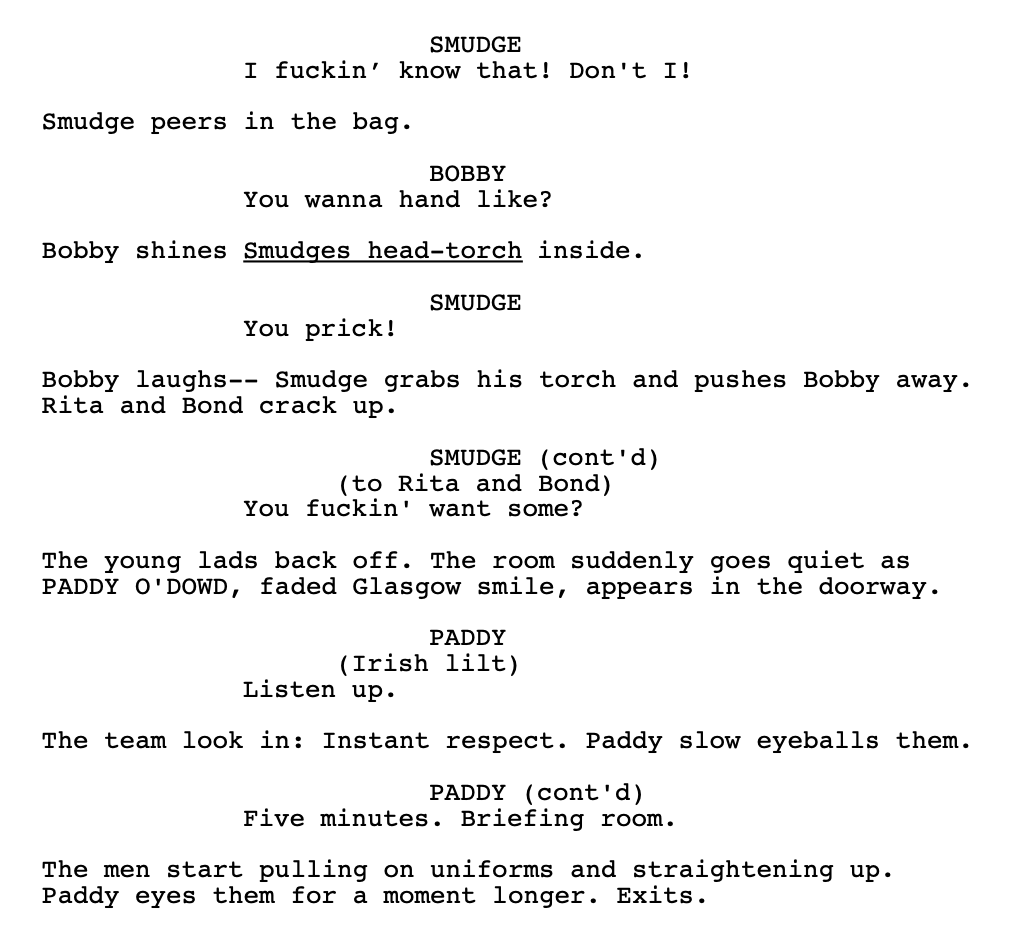
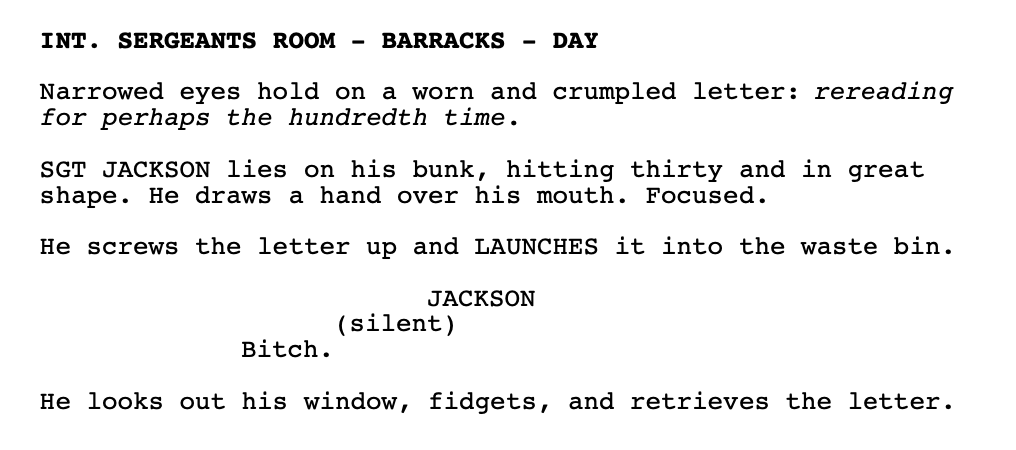
The second introduction at least tells us a little bit about Jackson. But it’s not a strong introduction by any means. You have to look for visual and active ways to make a character stand out so the audience knows: THIS PERSON IS IMPORTANT. THIS PERSON IS COOL. Cause if they’re not cool, we’re not paying attention to them. And that was a big issue here. A dozen characters were introduced and I didn’t know who the main three I was supposed to be focused on were until page 80. That’s specifically because of the poor introductions.
This is a major lesson I need to get across to you guys. All this stuff I’m teaching you about the first act isn’t just about the first act. It’s about the whole script. Because if you’re not doing certain things right in the first act, it reverberates throughout the rest of the story.
In my latest newsletter, I talk about Richter scale moments, moments in the screenplay that shake the ground to such a degree that the reader can’t help but get excited to read on. I didn’t see enough of those here. For example, we build up Parker as this big mystery character, to the point where she barely speaks. We occasionally see her sneak away and send a text to someone. So we’re expecting a big reveal with her, a Richter scale worthy moment. But when they finally confront Parker about her secret texting, she comes clean, explaining that they’re up against possibly super-strong Celtic warriors – something we’d pretty much figured out on our own already.
When you have a reveal scene, it needs to actually reveal something. It can’t reveal 15% more than what we already know. Especially in a movie like this. The reveal needs to shake the very foundation we’re standing on.
My favorite part of The Last Scion is when they’re captured and taken back to the village because I not only felt like they were in serious danger, but this place was so weird and unpredictable that you got the sense anything could happen. There’s a moment where the Celtics nail a soldier to a cross, like Jesus, stab him to death, and then the Celtic children dance in the dying soldier’s blood as it sprays all over them.
Unpleasant image? Sure. But shocking? Yes. And this script needed a lot more of that.
If I were producing this script, the first thing I would do is sit down with Azadi and figure out who the hero was. Cause right now, it’s not clear. Then I would spend the next three hours brainstorming an introductory scene for that character that audiences would remember for the rest of their lives. That doesn’t mean he has to outrun boulders. You can make a big impact in a small setting. Go watch Anton Chigurh’s opening scene in No Country for Old Men to see how. But we need to make this guy badass and we need to make it clear he’s running the show. Cause I had no idea who was running the show for three-quarters of the script.
Honestly, that’s going to solve a lot of the script’s problems. From there, you need to create bigger Richter scale moments. The bar isn’t three feet off the ground. The bar is three miles in the sky. Don’t come with your ‘okay’ stuff. Come with the stuff that’s going to get people talking for years once they see your movie.
Cause premises like this are perfect for movies. So the potential is there. But this feels like it’s 4-5 drafts from reaching that potential.
Script Link: The Last Scion
[ ] What the hell did I just read?
[x] wasn’t for me
[ ] worth the read
[ ] impressive
[ ] genius
What I learned: With scripts like this that have a ton of characters introduced up front, you need to dedicate an entire week of your prep JUST ON COMING UP WITH CHARACTER NAMES. Make sure every name is distinctive, memorable, and represents the character in question. I remembered, maybe, one quarter of the soldiers here because there were simply too many of them.
First of all, thanks everybody who submitted to the Showdown (a little over 300 of you!). You know I’d pick all of you if I could. But I could only choose SIX. Just know, I still love you! You should run your loglines by the readers of this site to see why you didn’t get picked. If you want to know straight from the horse’s mouth, you can order a logline consult from me. It’s just $25. E-mail carsonreeves1@gmail.com and put “logline” in the subject line.
But overall, this showdown was a blast. If only you could’ve joined me while reading through the submissions. A robot detective who is simply described as, “he has sex and vapes,” was sent my way. That’s my new character description of the year. We got our first ever script adaptation of a meme. Man has screenwriting changed since I was a kid. We had a theme park with reincarnated historical figures that almost made the cut. Multiple vampire huntress submissions were made (three, to be exact). Oh, we have a writer whose submission had to be voided because, in the time between when he submitted and now, his script got optioned and is being packaged by CAA (Take a bow, David Williams!).
So yeah, going through all those scripts was fun. But now it’s time to celebrate our six finalists. And it is up to you, the readers of this site, to decide the winner. Read as much of each script as you can, then vote on your favorite in the comments section (just post a comment with your pick). The winning script will be reviewed next week. You know what to do. Voting ends at 11:59pm Pacific Time, Sunday, February 27th.
And to the six of you who made Amateur Showdown… GOOD JOB and GOOD LUCK!
Title: Fish Story
Genre: Action, Comedy, Drama
Logline: Four seemingly unrelated stories, spanning over five decades, reveal how one of the first all-black punk bands recorded a song in 1974 that could help save the United States of America from a present day nuclear attack.
Why You Should Read: I’ve been writing for 16 years, mostly in the TV pilot world. Fish Story (2009) is one of my favorite movies, mostly due its infinite re-watchability and kick-ass title song. It’s also a Japanese movie, and I’ve gotten the rights to the short story Fish Story is based on by Kotaro Isaka (his latest book, Bullet Train, is being adapted into a movie starring Brad Pitt). For reference, my other favorite movies are Memento, Fight Club, Se7en, and Shaun of the Dead.
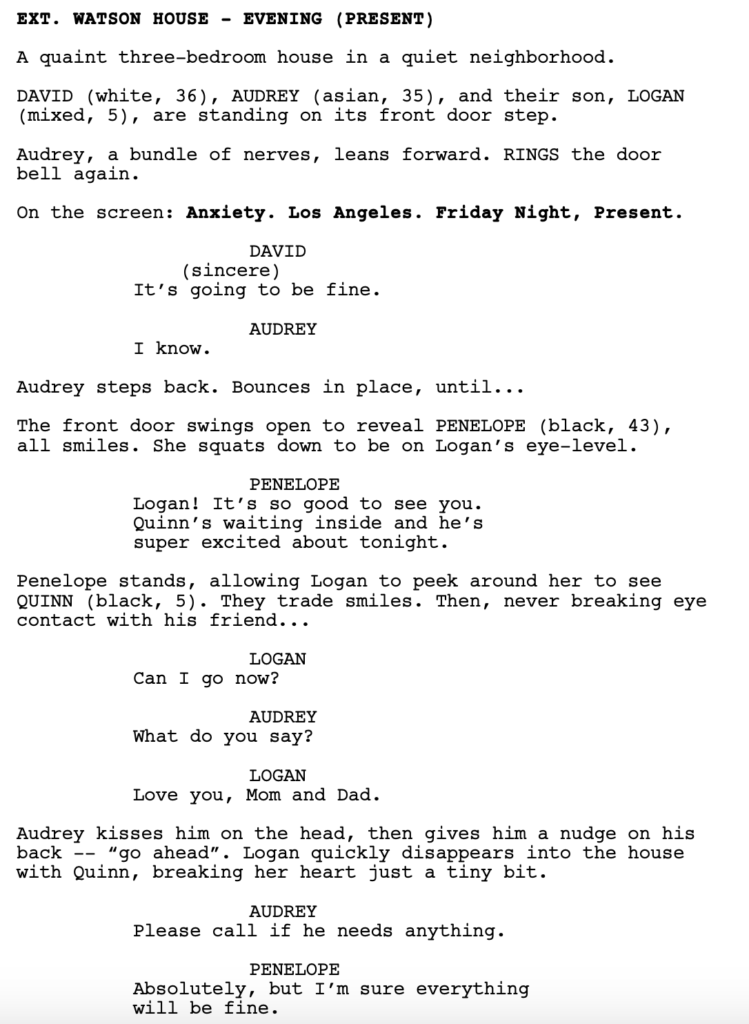
Title: Gladiator Warrior Battle-Dome 3000!
Genre: Sci-fi-Horror-Satire (this is anything goes round!)
Logline: After a botched robbery leads to their impending death, five dysfunctional criminals are transported into the future to become contestants on a game-show where they battle against teams from different historical eras in a futuristic gladiatorial arena to win a second chance.
Why You Should Read: After making the “High Maybe” list in the Last Great Screenplay Contest, and with the recent international success of Squid Game, I’ve continued to refine this outlandish, satirical action-horror. There’s time travel, a heist, and plenty of surprises along the way. I’d love to hear what Carson and the SS faithful have to say.
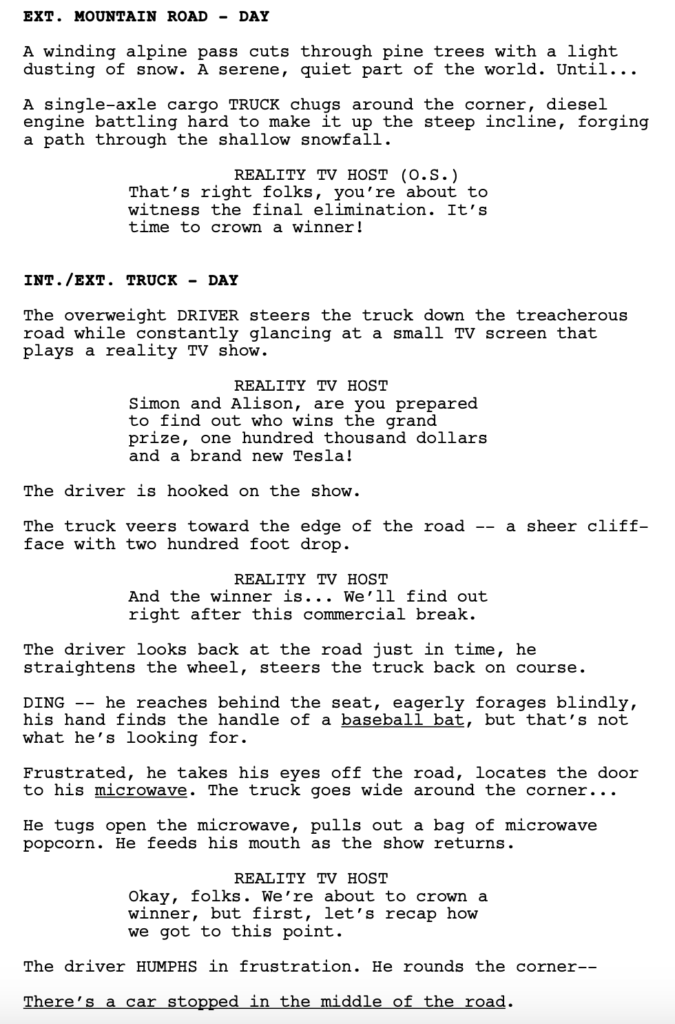
Title: POSSESSIVE
Genre: Romantic Comedy (with a pinch of horror)
Logline: A plucky young woman still recovering from a bad case of demonic possession returns to the dating scene hoping to find love, but having the devil as baggage sure isn’t helping.
Why You Should Read: I was raised by a single mom in a family with much darkness. Violence and addiction were all around. I retreated into my own world to escape that darkness. My own world was movies. Movies let me dream and laugh. Later, when I started writing screenplays, I realized that my darkness came through, but I always seemed to take that darkness and make it funny and hopeful. I love to write romantic comedies, but always with a twist. With POSSESSIVE, the jumping off point was, What happens after a woman recovers from a Demonic Possession? Does she date? How does she break the ice? What happens if she tries to hide her Possession from a guy she’s dating for as long as possible? I also wanted to deal with the affects a Possession would have on a person, since it’s a complete violation. How would someone cope with that trauma? POSSESSIVE is about the journey of Anna Norman – she’s funny, smart, shy, a little goofy, silly, persistent, and just happens to have been Possessed. Anna deserves her happy ending just as much as everyone else. POSSESSIVE is funny, heartfelt, romantic, and unique, and I think you’ll really enjoy it.
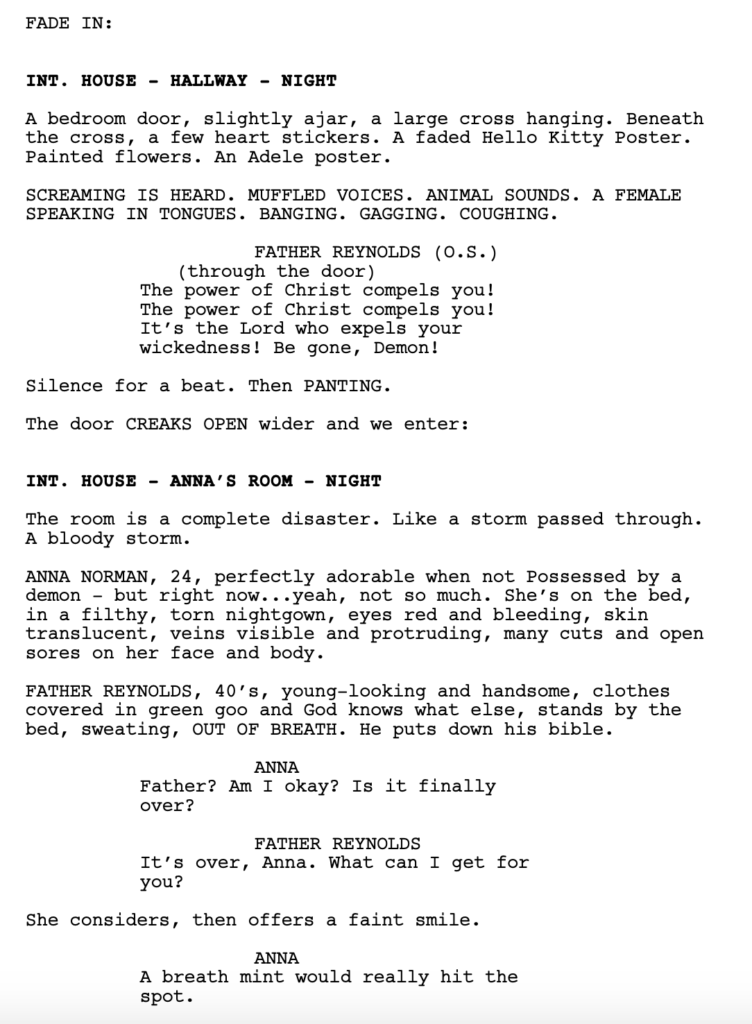
Title: DINAH
Genre: Family Comedy
Logline: In a world where genetically engineered “teacup dinosaurs” have become the world’s most popular pet, a recently widowed dad finally caves and buys one for his kids, but things go off the rails when the tiny dino grows into a full-sized brontosaurus named “Dinah.”
Why You Should Read: Hollywood is about high concept ideas and what’s better than a WORLD WHERE TEACUP DINOSAURS ARE PETS. Cute, tiny dinosaurs. Think of the merchandising opportunity… cha-ching! Plus this isn’t your typical kid-friendly family comedy. We push the edginess and make this fun for ALL ages. Plus, our zany villain has major Elizabeth Holmes vibes. Jurassic Park has basically saturated the market for “dinosaur” movies but luckily we have a fresh take on a type of movie that the whole family can enjoy. I mean, imagine a world where you walk down to grab your UberEats and you see a woman walking a tiny triceratops. That’s OUR world. It’s part BEETHOVEN and part JURASSIC PARK. Enjoy!
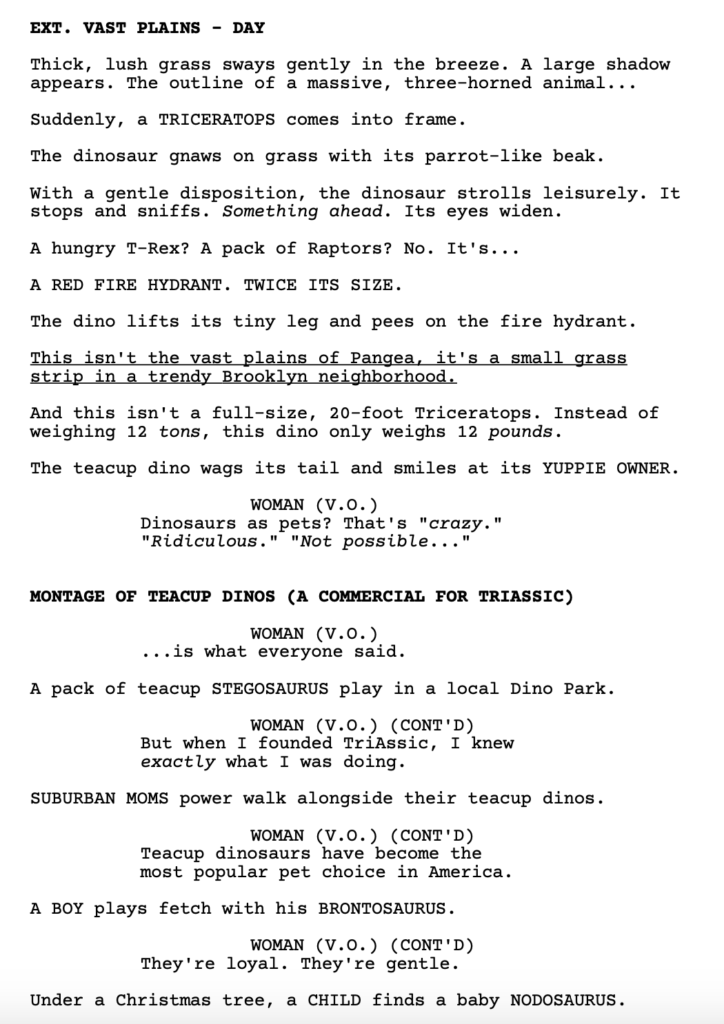
Title: The Last Scion
Genre: Action/fantasy
Logline: A combat veteran fights to keep his inexperienced squad alive in the remote Scottish Highlands as they’re hunted by descendants of a Celtic Demigod.
Why You Should Read: I’ll let the logline speak for itself, either it’s your bag or not ;)…. Comparisons: Dog Soldiers/Wickerman/Southern Comfort.
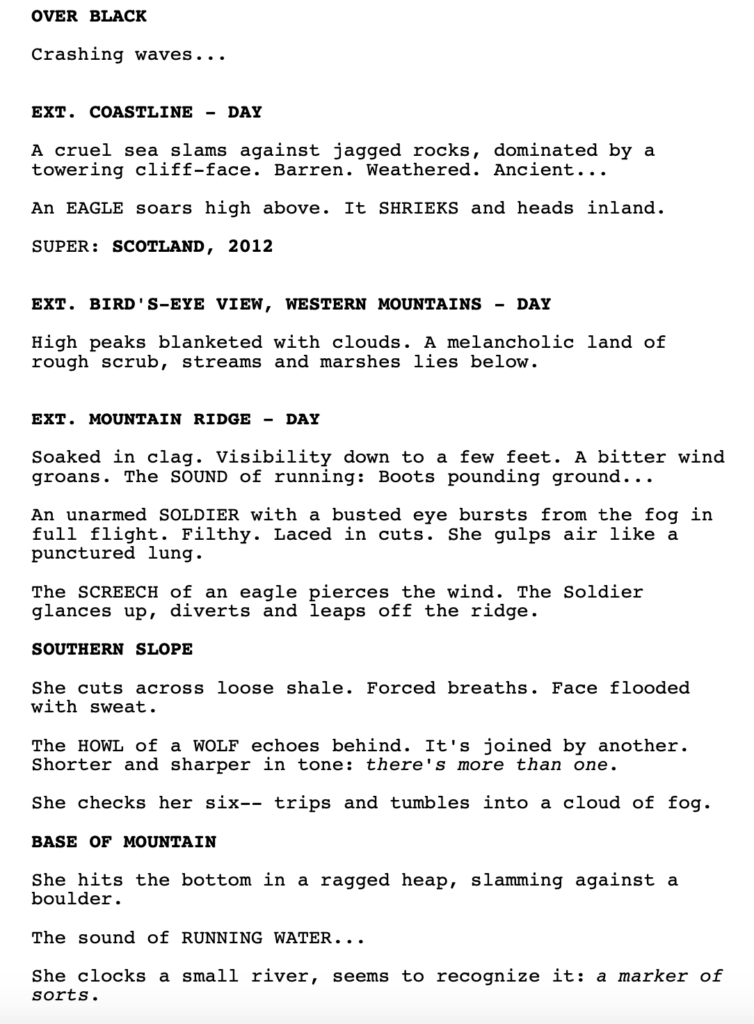
Title: Average Joe
Genre: Satire, Political Thriller
Logline: The ‘true’ story of Joe McCarthy, where he was just a patsy and the real threat was a secret government capitalist conspiracy. To save America and clear his name, Joe must get help from his most despised nemeses; blacklisted Hollywood screenwriters.
Why You Should Read: The great myth of blacklisting is that it was all Joe McCarthy’s fault and his alone, the blacklist was all caused by that one bad apple and nobody else was involved and once he was gone everything was great again, another feel-good over-simplification to shift the blame to the dead and ignore our own complicity. Conflating the Army-McCarthy Hearings with the HUAC Hearings, hand-waving away ‘it’s all just more McCarthyism.’ This wasn’t the first American witch hunt or the last and it wasn’t all one man’s crazy evil power trip. McCarthy was a terrible person, yes, but he had supporters and enablers aplenty. — So I wrote a fun political satire that calls out all the great scheming assholes of the time (Hoover, Cohn, Nixon, Thurmond, Daddy Kennedy, etc) while viciously gutting all the ‘things were better back then’ 1950s nostalgia. McCarthy is more of a naïve Zelig figure here, meeting all the future presidents and teaming up with the blacklisted screenwriters (the goal not being to give McCarthy a pass but to indict everyone else by association). In terms of the worst crimes America has ever perpetrated on its own people, the blacklist is pretty far down the list but it deserves a good evisceration. We haven’t had a solid satire in goddamn forever and with a McCarthy biopic on the horizon (from the screenwriter of The Hitman’s Bodyguard and Fire with Fire, of all things), the time feels right.
